|
|
|
Sort Order |
|
|
|
Items / Page
|
|
|
|
|
|
|
| Srl | Item |
| 1 |
ID:
124263
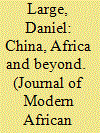

|
|
|
|
|
| Publication |
2013.
|
| Summary/Abstract |
Not so long ago, it was common to af?rm that China was the most important development in Africa's politics and international relations since the end of the Cold War. Now, after an upgrade, China is commonly held to be the most important development for Africa in the twenty-?rst century. In a relatively short period of time -Beijing's Year of Africa in ???? was also the year when China's relations with the continent acquired global visibility thanks in large part to the third Forum on China Africa Cooperation- the theme of China-Africa has been catapulted out of the mostly overlooked margins and into the conspicuous mainstream of all kinds of attention. The tour of Tanzania, South Africa and the Republic of Congo by China's President Xi Jinping in March ???? and that of US President Barack Obama to Senegal, South Africa and Tanzania some three months later stimulated more attention. It demonstrated the diverse varieties of critical and celebratory interest in media and social media coverage, as well as a growing body of China-Africa ?lms and ?ction.
|
|
|
|
|
|
|
|
|
|
|
|
|
|
|
|
| 2 |
ID:
124258
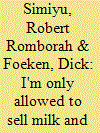

|
|
|
|
|
| Publication |
2013.
|
| Summary/Abstract |
This paper deals with the gender aspects of urban livestock keeping in Eldoret, Kenya. It shows that men and women play different but complementary roles in livestock keeping. Men show greater preference for and are more involved - in terms of decision-making and responsibility taking - with large livestock and where income is the primary motive for livestock keeping, and perform tasks of an outdoor nature and/or which require considerable technical knowledge. On the other hand, women prefer and exercise greater control over small livestock, make the most decisions about consumption use of livestock products, and perform home-based routine tasks. However, there are instances where men and women cross gender boundaries, for instance where labour of the opposite gender is absent in the household, or as a strategy to control benefits accruing to the livestock. In terms of livelihood outcomes, women's role in livestock keeping is geared more towards improving household nutritional and food security status, while men's role is motivated more by personal benefits.
|
|
|
|
|
|
|
|
|
|
|
|
|
|
|
|
| 3 |
ID:
124259
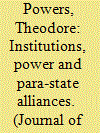

|
|
|
|
|
| Publication |
2013.
|
| Summary/Abstract |
From 1999 to 2008, delays in the adoption of a comprehensive treatment and prevention programme shortened the lives of people living with HIV/AIDS in South Africa. While the slow implementation of antiretroviral therapy has been attributed to a lack of institutional capacity, dissident views on HIV/AIDS and the effects of fiscal austerity, it was also an expression of power. This article analyses how the South African HIV/AIDS movement overcame this exercise of power by the AIDS dissident faction of the African National Congress (ANC) by building an alliance with the South African labour movement and moderate elements within the ruling party. The ANC's dissident faction responded to this by developing para-state partnerships with non-state organisations to support the AIDS dissident agenda. This study highlights the need to expand the para-state concept to take into account a wider range of social formations and the historically particular conditions under which they emerge.
|
|
|
|
|
|
|
|
|
|
|
|
|
|
|
|
| 4 |
ID:
124257


|
|
|
|
|
| Publication |
2013.
|
| Summary/Abstract |
Ghana's pursuit of socio-economic growth has necessitated joining the information communication technology (ICT) revolution, thus increasing the consumption and obsolescence rate of electrical and electronic equipment (EEE) and the creation of what is popularly called e-waste. The absence of legislation governing its importation and disposal, combined with the dynamics of Accra's urban economy, including neo-liberal policies and lack of formal job opportunities, has triggered people's ingenuity to engage in novel occupations such as e-waste recycling. Though a lucrative strategy, it comes with a price for those involved: environmental health risks, a fact well articulated by a burgeoning literature. Nevertheless, little empirical evidence exists relating to this perceived relationship. Using questionnaires, FGDs and in-depth interviews, this study fills the lacuna. The findings reveal that the mean daily income of an e-waste worker is GH¢??, far above the daily minimum wage of GH¢?·??. Despite the positives, the findings also show that the environment and health can be compromised.
|
|
|
|
|
|
|
|
|
|
|
|
|
|
|
|
| 5 |
ID:
124262
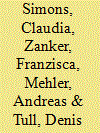

|
|
|
|
|
| Publication |
2013.
|
| Summary/Abstract |
Research on power-sharing in Africa remains silent on the effects of national peace agreements on the sub-national level. Conversely, most armed conflicts originate and are fought in (or over) specific areas. A plausible hypothesis would be that for power-sharing to have the desired pacifying effect throughout the national territory, it needs to be extended to the local level. Based on fieldwork in six former hotspots in Liberia, Burundi and the Democratic Republic of Congo (DRC) we find that there is hardly any local content, including local power-sharing, in national agreements. However, contrary to our hypothesis, neither local content (inclusion of actors or interest) nor local-power-sharing (either introducing a local power balance or monopoly) are indispensable to effectively bring about local peace, at least in the short-term. On the contrary, it might even endanger the peace process. The importance of the sub-national level is overestimated in some cases and romanticised in others. However, the history of spatial-political links, centralised policies, and the establishment of local balances or monopolies of power ultimately play an important role.
|
|
|
|
|
|
|
|
|
|
|
|
|
|
|
|
| 6 |
ID:
124261
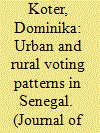

|
|
|
|
|
| Publication |
2013.
|
| Summary/Abstract |
One of the most striking voting patterns in many African elections is the marked difference between urban and rural voters in their willingness to support the incumbent. In many countries, incumbents receive their worst electoral scores in the cities, whereas the countryside votes overwhelmingly for them. This pattern is puzzling because there is no evidence that rural areas benefit more from government policies. On the contrary, most governments in Africa exhibit a pro-urban policy bias. Why then do rural voters support incumbents at higher rates? Using evidence from original interviews with politicians in Senegal, coupled with media coverage from several elections, I contend that incumbents enjoy higher success in rural vis-à-vis urban areas because rural voters are more susceptible to clientelism. Tight social structure, cohesion and the prominent role of local patrons facilitate the acquisition of entire blocs of rural voters for the incumbent. These findings are independent of ethnic, religious or party identity.
|
|
|
|
|
|
|
|
|
|
|
|
|
|
|
|
| 7 |
ID:
124260
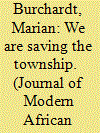

|
|
|
|
|
| Publication |
2013.
|
| Summary/Abstract |
In this article, I trace the emergence of Pentecostal FBOs in the South African city of Cape Town. By focusing on their involvements in HIV/AIDS programmes, including practices such as health education, counselling and material support, I analyse the organisational dynamics and consequences ensuing from their activities. Pentecostal involvements in development work engender complex connections between two distinct processes: On the one hand, they offer Pentecostal communities new social spaces for promoting their faith and moral agendas. On the other hand, development work urges Pentecostal communities to recast their activities in the logic of formal organisation and accountability (proposals-grants-projects). On the ground, these logics are constantly subverted as beneficiaries construe FBOs as patrons and deploy Pentecostal identities for mediating access to FBOs and the resources they command. My argument is that Pentecostal faith works to mediate the entire set of social relationships, expectations, imageries and practices that structure FBO work on the ground. More than belief and ritual, it is Pentecostal belonging that links organisations, people, opportunities and resources.
|
|
|
|
|
|
|
|
|
|
|
|
|
|
|
|
|
|
|
|
|